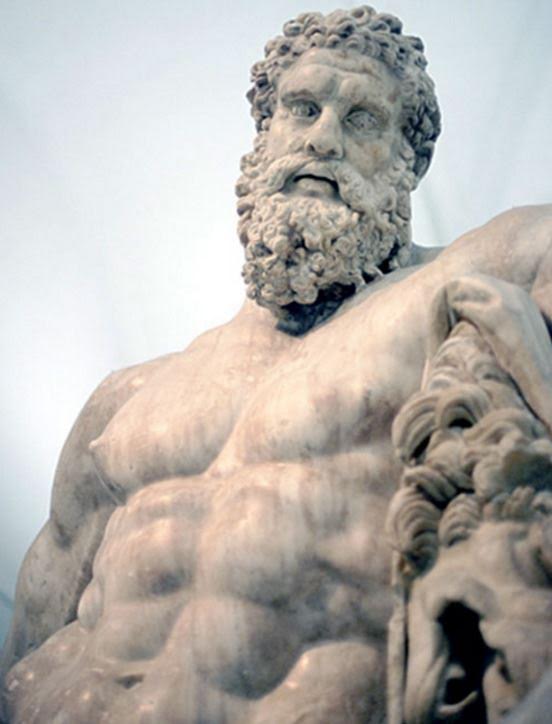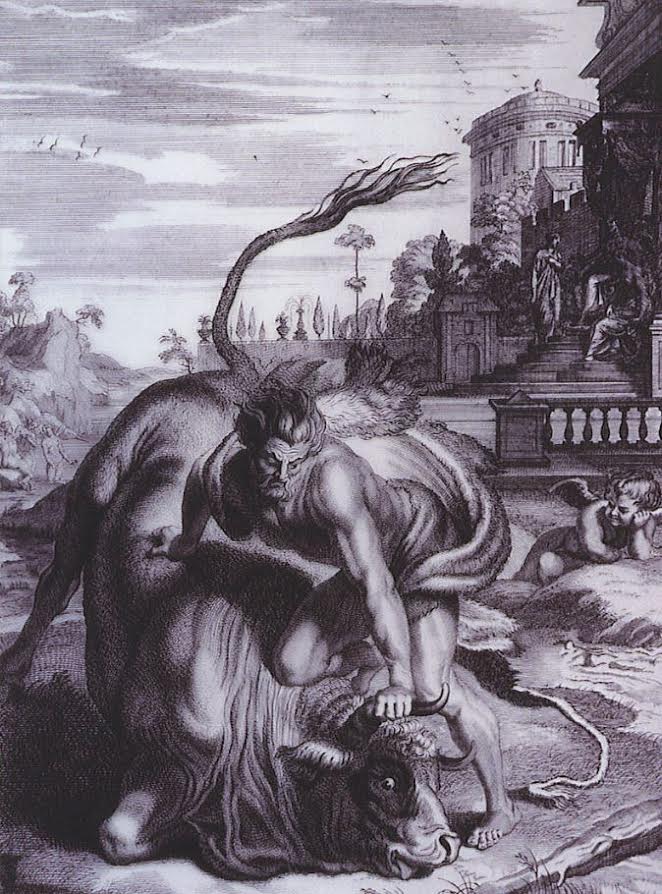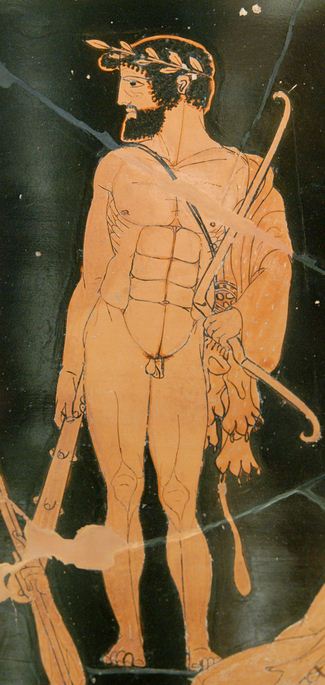Alas! alas! lament, O city; the son of Zeus, thy fairest bloom, is being cut down. Woe is thee, Hellas! that wilt cast from thee thy benefactor, and destroy him as he madly, wildly dances where no pipe is heard.
She is mounted on her car, the queen of sorrow and sighing, and is goading on her steeds, as if for outrage, the Gorgon child of Night, with hundred hissing serpent-heads, Madness of the flashing eyes. Soon hath the god changed his good fortune; soon will his children breathe their last, slain by a father’s hand. (Euripides – Herakles)
In Part I of this series on Herakles, we looked at his triumphs, the Twelve Labours that set him down on the papyrus pages of ancient history as the greatest hero. He was a man of great strength, appetites, perseverance, and emotion. He traveled the world achieving feats that would have defeated any other man of his time.
The tales of Herakles’ heroics have inspired for centuries.
But, as with all tales from ancient Greece, triumph and tragedy go arm in arm in the hero’s life.
The tragedy of Herakles’ life actually began, as mentioned in Part I, before his twelve labours, when he was driven mad by Hera and ended up killing his wife, Megara, and their children.
Ah me! why do I spare my own life when I have taken that of my dear children? Shall I not hasten to leap from some sheer rock, or aim the sword against my heart and avenge my children’s blood, or burn my body in the fire and so avert from my life the infamy which now awaits me? (Euripides – Herakles)
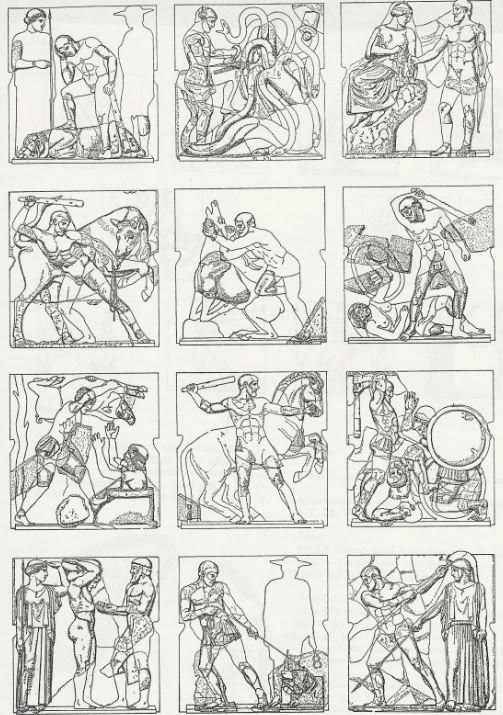
Metopes of the 12 Labours adorning the Temple of Zeus at ancient Olympia
The twelve labours were a part of his atonement for this horrifying crime.
One would have thought that with the Labours he had paid the price, but that would be too easy. As we shall see in this brief post, Herakles would be made to suffer and live a life of rage and pain till the end of his days. There would be no sitting on his laurels.
As the following passage shows, even in the fiery realm of Hades, Herakles’ shade is dark and menacing, someone even the dead are afraid of:
Next after him I observed the mighty Herakles – his wraith, that is to say… From the dead around him there arose a clamour like the noise of wild fowl taking off in alarm. He looked like black night, and with his naked bow in hand and an arrow on the string he glanced ferociously this way and that as though about to shoot… (Homer – The Odyssey)
Herakles is often known as ‘Alexikakos’, the ‘averter of evil’, but this proved impossible when it came to himself.
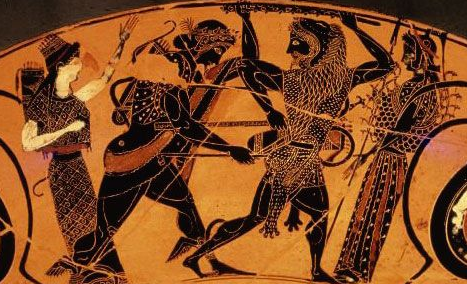
Apollo and Herakles fighting over the Delphic Tripod
He was often helping others, such as when in Hades, he found Theseus, another hero, in his punishment, and raised him up to be free back on Earth.
But did others often help Herakles?
Sometimes. During his labours, he did receive aid from Athena, Atlas, Helios, and from his cousin, Iolaus, but most of the time, he had to go it alone.
After the Twelve Labours, Herakles seems to have become a sort of fallen hero.
When he kills Iphitus, the son of Eurytus who had refused to give the hero the hand of his daughter, Iole, he becomes diseased because of the murder; this is a punishment from the Gods.
Herakles goes to the Oracle at Delphi, but the Oracle refuses to answer him this time. In a rage, Herakles attempts to steel the sacred tripod which Apollo tries to take back.
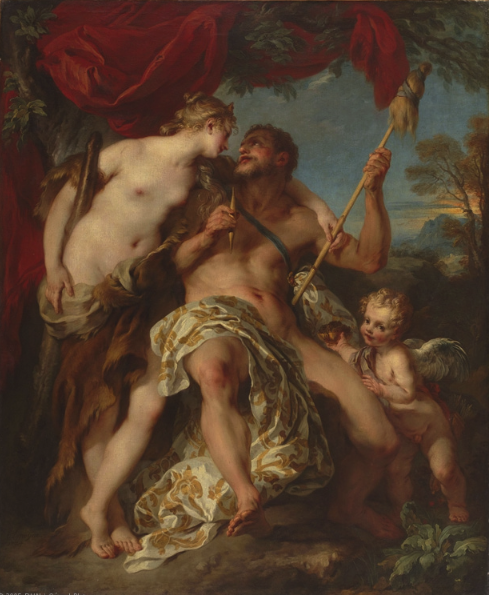
Herakles and Omphale
Zeus steps in to stop the quarrel between his two sons, and the Oracle complies in giving Herakles an answer; he must sell himself into slavery for three years.
He is ‘bought’ by Omphale, a Queen of Lydia. It is during this time of servitude that Herakles joins the Argonauts, one of the most famous crews in history, in their search for the Golden Fleece. Even here, the hero is not allowed to be a part of the Argonauts’ success as he is left behind in Mysia to search for his friend, Hylas, who was abducted by water Nymphs.
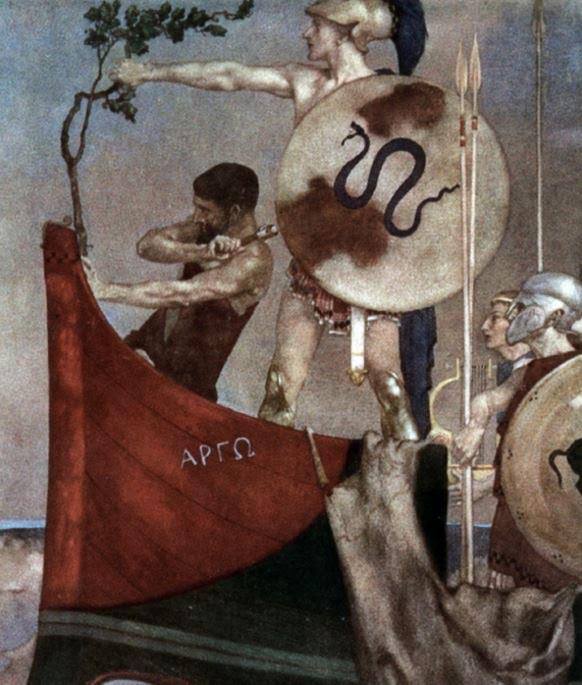
The Argonauts
Once his service to Omphale was settled, Herakles seems to have set out on a fit of vengeance to settle some old debts.
He raised an army with Telamon and sailed to Troy where he captured the city and killed King Laomedon. He also killed all the Trojan princes too, except Priam.
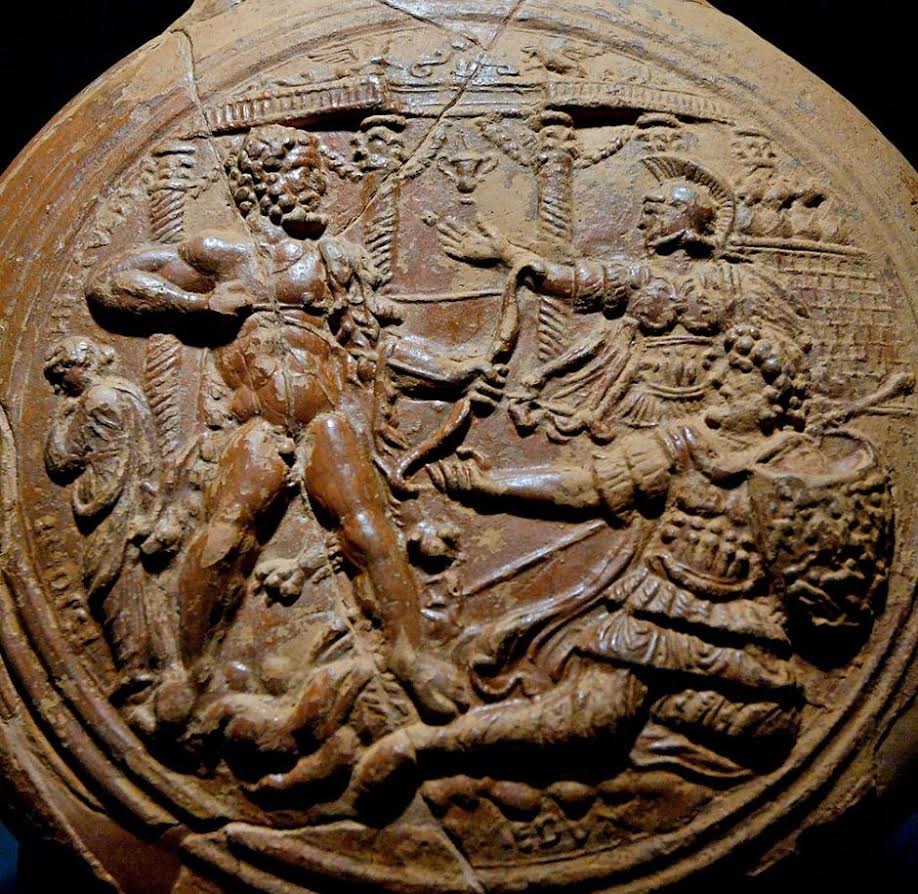
Herakles about to kill Laomedon
Other acts of revenge included killing King Augeas of Ellis, and his sons, who had refused to pay up for the cleaning of his stables.
Herakles then marched to Pylos to face Neleus who had refused to purify him of the murder of Iphitus who was a guest of Herakles’ in Tyrins at the time. Herakles slew Neleus and all twelve of his sons except Nestor who was away at the time, and who would be a part of the later Trojan War.
On top of all this, Hera did not relent in her persecution of Herakles. She sent storms to pursue the hero, but it is at this point that Zeus finally says enough is enough. The king of the gods suspends Hera from Mt. Olympus with anvils tied to her feet.
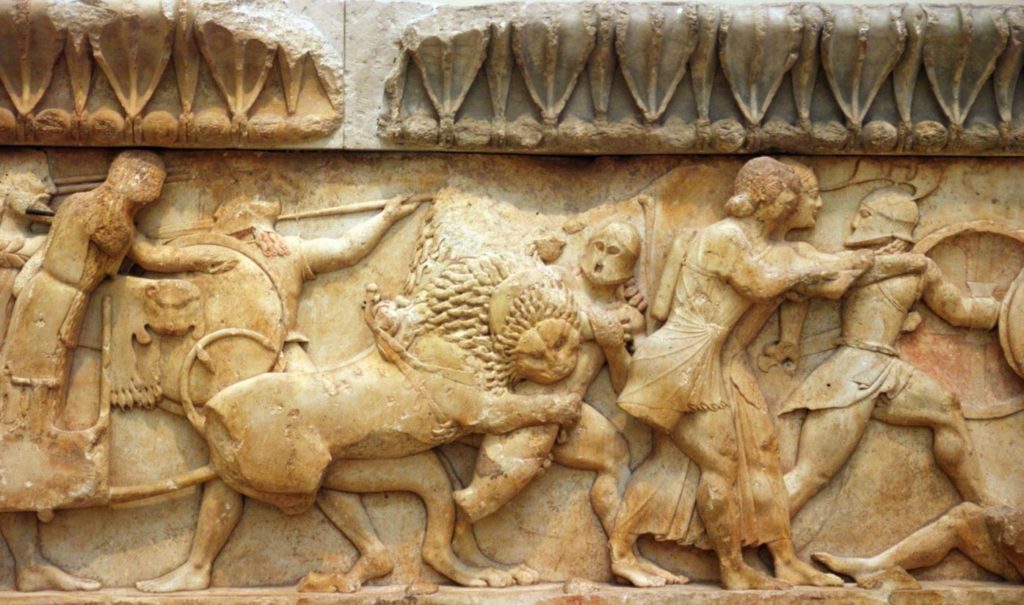
Battle of the Gods and Giants – Siphnian Treasury at Delphi)
Then the Gods themselves need Herakles’ help at Phlegrae, in Thrace. The Battle of the Gods and Giants is one of the most widely depicted events in ancient Greek art. It is here that Herakles played a key role in aiding the Gods to victory.
But, exhaustingly, sadly, that is not the end for Herakles. It is not time to rest. He continues with his acts of vengeance, among them the sacking of Sparta, and the killing of Hippocoon and all his sons.
Our fallen hero has much blood on his hands at this point, but finally, after so much turmoil, he finds a measure of happiness in Calydon where he marries Deianeira, the daughter of King Oeneus. She is also the sister of Meleager, whom Herakles had spoken with in Hades on his twelfth labour.
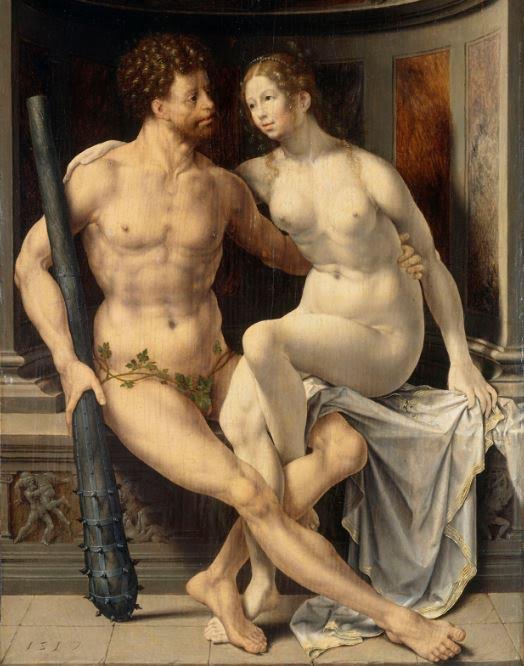
Herakles and Deianeira
While in Calydon, Herakles helps his father-in-law to defeat his enemies. He and Deianeira have several children together. She is beautiful, virtuous, and loves her husband dearly.
But the idyllic time is short-lived. At one point, Herakles accidentally kills King Oeneus’ cup bearer, and so he, Deianeira, and their children are forced to leave Calydon. They settle in Trachis.
On one part of their journey, they must cross the river Evenus. While he is crossing the river, it seems that Herakles entrusts his wife to the centaur, Nessus, who tries to rape her.
Herakles’ rage takes over and he kills Nessus with one of his arrows dipped in the blood of the Hydra.
As Nessus lays dying, he whispers to Deianeira that his own blood is a powerful love charm, and that she should take some and keep it hidden if ever she needed it.
Deianeira saves some of the centaur’s blood.
While in Trachis, Herakles helps his host King Ceyx, to defeat his enemies. It seems that kings were happy to host Herakles if he helped them to defeat their foes. Herakles then helped Aegiaius to fight and defeat the Lapiths, and in that conflict, he killed Cycnus, the son of Ares, in single combat, as well as wounding Ares himself.
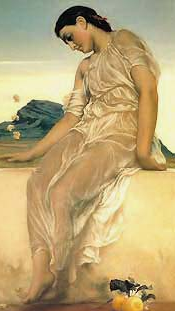
Iole
Bent on vengeance once more, Herakles raises an army and marches against Eurytus who had refused him the hand of Iole. Herakles takes the young girl as his concubine and, along with many prisoners, brings her back to Trachis.
The springs of sorrow are unbound,
And such an agony disclose,
As never from the hands of foes
To afflict the life of Heracles was found.
O dark with battle-stains, world-champion spear,
That from Oechalia’s highland leddest then
This bride that followed swiftly in thy train,
How fatally overshadowing was thy fear!
But these wild sorrows all too clearly come
From Love’s dread minister, disguised and dumb.
(Sophocles – The Women of Trachis)
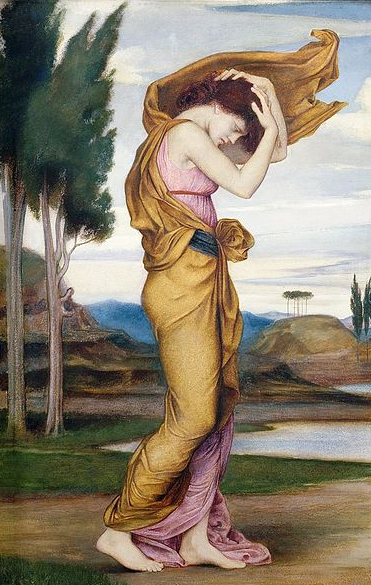
Deianeira mourning
Deianeira realizes that her husband loves the quiet, beautiful Iole, and decides to use the supposed ‘love-charm’ of the centaur’s blood.
At this time, Herakles was in Euboea sacrificing to Zeus for his many triumphs over his enemies. He sent to Deianeira for his finest robe for the ceremonies. With this act of piety, Herakles seals his doom, for Deianeira smears the blood of Nessus on the robe thinking that it will make Herakles love her again.
The blood begins to eat into Herakles’ flesh like acid, killing him slowly.
When Deianeira hears from their son, Hyllus, what she has done, she kills herself in despair. The nurse to the Chorus:
When all alone she had gone within the gate,
And passing through the court beheld her boy
Spreading the couch that should receive his sire,
Ere he returned to meet him,—out of sight
She hid herself, and fell at the altar’s foot,
And loudly cried that she was left forlorn;
And, taking in her touch each household thing
That formerly she used, poor lady, wept
O’er all; and then went ranging through the rooms,
Where, if there caught her eye the well-loved form
Of any of her household, she would gaze
And weep aloud, accusing her own fate
And her abandoned lot, childless henceforth!
When this was ended, suddenly I see her
Fly to the hero’s room of genial rest.
With unsuspected gaze o’ershadowed near,
I watched, and saw her casting on the bed
The finest sheets of all. When that was done,
She leapt upon the couch where they had lain
And sat there in the midst. And the hot flood
Burst from her eyes before she spake:—‘Farewell,
My bridal bed, for never more shalt thou
Give me the comfort I have known thee give.’
Then with tight fingers she undid her robe,
Where the brooch lay before the breast, and bared
All her left arm and side. I, with what speed
Strength ministered, ran forth to tell her son
The act she was preparing. But meanwhile,
Ere we could come again, the fatal blow
Fell, and we saw the wound. And he, her boy,
Seeing, wept aloud.
(Sophocles – The Women of Trachis)
Back on Euboea, Herakles, in great pain, knows it is his time and has a pyre built for himself on Mount Oeta. He climbs up onto the pyre and asks for help lighting it.
But no one will help the hero.
Poor Herakles…
Finally, a passing shepherd by the name of Poeas, who is looking for his sheep, decides to help Herakles. As a gift, Herakles gives Poeas his great bow and arrows.
Now my end is near, the last cessation of my woe. (Sophocles – The Women of Trachis)
As the pyre burned, thunder raged in the sky, and Herakles is taken to Mt. Olympus to join the ranks of the Immortals.
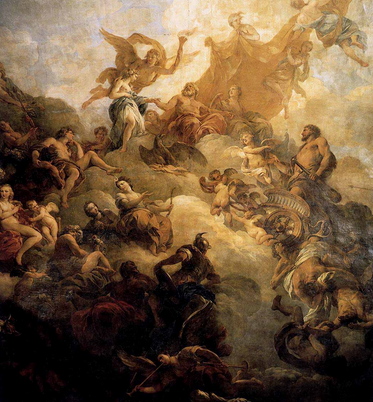
Apotheosis of Herakles (Francois Lemoyne)
After all the pain and hatred, he and Hera are finally reconciled, and he is married to Hebe, the Goddess of Youth.
As an eternal monument to his long-suffering son, Zeus sets Herakles in the stars where he kneels to this day.

Herakles Constellation

